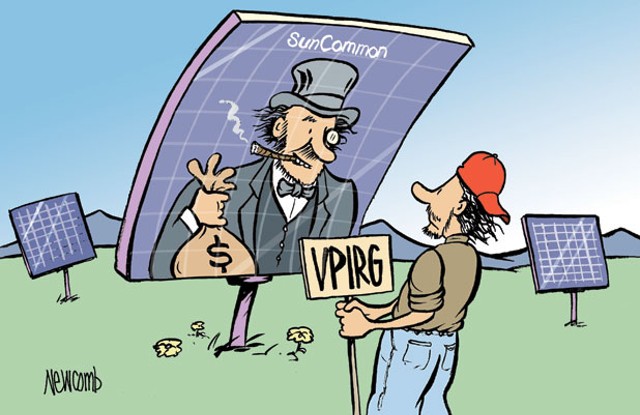Published March 14, 2012 at 11:02 a.m.
Founders of a new residential solar company called SunCommon hailed their business at a splashy press conference in Williston last week.
Surrounded by an array of solar panels, dignitaries including Gov. Peter Shumlin and a crowd of new hires wearing gray company hoodies, copresidents Duane Peterson and James Moore said their company would change the way green business is done in the state.
But the evolution of SunCommon from a pilot program of the Vermont Public Interest Research Group to a private, for-profit business illustrates how the mission of an advocacy organization may be compromised when profits come into play.
In September 2010, the consumer and environmental advocacy group VPIRG launched a bold new program that would extend its influence beyond the Statehouse. Targeting specific Vermont towns and counties, it used its community-organizing model to design and market rooftop solar installations to homeowners.
In the course of a year, the program — alternately called “VPIRG Energy” and “Solar Communities” — installed 130 electric solar systems and 170 solar hot water systems. According to VPIRG executive director Paul Burns, the program generated $4 to $5 million in sales, raising $275,000 for VPIRG.
Burns says the idea came from feedback it received during its annual door-knocking campaign. “People kept asking us, ‘How can you make it easier for me to install solar? What can you do about that?’”
Guiding the program were two longtime VPIRG hands who had worked together in the group’s fight to shutter the Vermont Yankee nuclear power plant: VPIRG’s energy lobbyist James Moore and its board president — and sometime employee — Duane Peterson.
Peterson, former “chief of stuff” for Ben & Jerry’s, says he came up with the program during a brief hiatus from his day job at VPIRG and decided to “donate” its concept to the advocacy group.
Within a year — by summer 2011 — it became clear to all involved that the program was a wild success and that “it needed to grow out of VPIRG,” says Moore. “We needed to take on some investment capital and start a separate company.”
Peterson and Moore spent the second half of 2011 establishing a new company, which was registered with the Vermont secretary of state’s office in December as a “benefit corporation” — a for-profit company with a social mission. By year’s end, Peterson and two other VPIRG employees had joined the “company” — though Peterson remained VPIRG’s board president.
Moore was still a VPIRG lobbyist when he made his plans public before the House Natural Resources and Energy Committee on January 10. “I think you all have made Vermont a place that can lead the nation in residential solar,” Moore announced, “and I want to be part of that on the other side of the coin. So hopefully I’ll be back here, but as a small business owner.”
By the time of the hearing, Moore and Peterson had raised hundreds of thousands of dollars in start-up funding for SunCommon, hired a staff of 17 and were readying for a public launch in early March. But, Moore told the panel, “Today I am 100 percent wearing my VPIRG hat.”
Moore went on to advocate for slight tweaks to a comprehensive solar incentive bill signed into law the previous spring with VPIRG’s support, including a higher threshold below which residential solar projects would be given expedited review for approval by a state board. He argued that because the average Vermont homeowner would require a six- or seven-kilowatt solar system, the threshold should be increased from five to 10 kilowatts.
“Where the number is now kind of makes it a little confusing out in the marketplace. Increasing it to 10 would make a lot of sense,” Moore told the panel.
A second tweak he argued for would fix a loophole that allowed the Burlington Electric Department to offer just 16 cents for every kilowatt-hour of solar energy produced by homeowners, rather than an intended statewide standard of 20 cents. Moore said this was keeping solar installation companies from operating in Burlington.
“Out there, as we were saying, in the real world, in the field, if I — and I will be in a couple months — were running a solar company, would I go to Burlington, where the solar rate is different than everywhere else — it’s smaller and it’s totally up in the air in terms of what’s going to happen — or am I going to go somewhere else?” he asked.
Coincidentally, Moore’s two VPIRG-sanctioned tweaks would have directly benefitted his own business. According to internal SunCommon documents obtained by Seven Days, the company is banking on the legislature changing the threshold for expedited review, noting that, “2012 legislation will seek to extend the less onerous registration process to include systems up to 10kW — effectively including all potential [SunCommon] residential systems.”
Moore said in a later interview that SunCommon would not do business in Burlington until BED pays the full 20-cent incentive — a situation that would be resolved if the legislature passes the fix for which he was lobbying.
Is all this kosher?
Rep. Michael Hebert (R-Vernon), who sits on the energy committee, says he likes and respects Moore but he believes the testimony had “a bad flavor to it.”
Committee Chair Rep. Tony Klein (D-East Montpelier) says he found it “weird” that VPIRG created the solar installation program in the first place, given the group’s advocacy mission.
“It’s odd. There’s no question about it that it’s odd,” he said. “I’ve never heard of it happening before. But again, what’s even odder is if nobody within the organization questions it.”
Executive director Burns doesn’t think Moore had a conflict of interest when he testified. “When he was working for us, he was advancing the precise policies VPIRG was standing for and will continue to stand for going forward,” Burns said. “If somebody then leaves our staff and sets up a business to promote solar energy in the state, and that program makes it more possible for that business to flourish, I don’t see that as a conflict. I see that as a success.”
In a follow-up interview, however, Burns said it would have been better if Moore’s successor, Ben Walsh, had done all the talking during the committee hearing.
“But at the end of the day, fighting too hard to make solar affordable is a criticism I can live with,” Burns said.
Unshackled from its nonprofit parent, SunCommon is now poised to make some cash. According to company documents, revenues are expected to grow from $2.2 million to $3.4 million by 2014. In that time, net income is projected to increase from $490,000 a year to $1.1 million.
If that happens, some VPIRG board members will be rewarded.
In addition to board president Peterson, SunCommon’s principal investors in the million-dollar start-up include VPIRG board treasurer Mathew Rubin, secretary Crea Lintilhac and member Barbarina Heyerdahl. A number of other big VPIRG donors also count themselves as SunCommon investors.
The company’s pitch to potential investors borrows the metrics and methods of VPIRG’s pilot program. And the VPIRG website still refers interested customers to “the new solar venture.”
For all that, according to company documents, SunCommon plans to pay VPIRG $100,000, pending an independent appraisal of transferred assets. Burns confirmed that the figure cited is “about accurate.”
Harder to quantify is the value of the relationship Moore and Peterson sought with Green Mountain Power. In August 2011, the duo approached GMP about partnering with the electric company to offer a solar lease to its customers.
According to SunCommon documents, “Green Mountain Power’s CEO and senior staff invested significant time with us to develop this innovative utility partnership,” and Moore and Peterson flew to California with a GMP representative to tour a solar manufacturing facility.
Green Mountain Power never sealed the deal, but documents indicate SunCommon continues to believe it has “the inside track to GMP” and will be “in an ideal position to leverage the utility’s brand image, access to capital and billing systems to dramatically increase our sales.”
GMP spokeswoman Dotty Schnure only confirmed discussions between the two companies.
“While we are not involved in SunCommon’s solar leasing program, we wish them the best in their efforts to bring solar to Vermonters and hope they are very successful,” she said.
Moore and Peterson’s negotiations with GMP occurred against the backdrop of the largest proposed electric utility merger in Vermont’s history. In July 2011, GMP’s parent company, Gaz Metro of Canada, secured a buyout of Central Vermont Public Service, the only electric company in Vermont larger than GMP. If a state board approves the merger, the resulting company will control 70 percent of Vermont’s energy market.
SunCommon documents presuppose the merger’s approval, saying, “what will soon be the largest utility in Vermont has shown great interest in forward-thinking energy planning.”
Meanwhile, VPIRG had to decide if it was going to take a stand against the merger. But because of the ongoing talks that summer between the solar spinoff and GMP, Burns says he made sure Moore did not play a role in VPIRG’s deliberations on the matter.
Barry Bernstein, president of the Washington Electric Cooperative’s board of directors, remembers it differently. He says Moore represented VPIRG at an August meeting of potential merger opponents. Burns confirmed that, but said Moore was replaced in such discussions shortly thereafter.
VPIRG filed a motion to intervene in the pending merger in October and filed testimony in December generally supportive of the deal, saying it held “substantial benefits, both short and long term,” for Vermonters. Though VPIRG raised questions about the concentration of power Gaz Metro would hold over the state’s transmission utility, it backed the broader outlines of the deal.
Sen. Vince Illuzzi (R-Essex/Orleans) was disappointed. An outspoken opponent of the merger, he noted, “It’s the perfect thing for VPIRG to take the lead on.”
Illuzzi doesn’t think it’s a coincidence that GMP continued to negotiate with the VPIRG spinoff as the merger was debated.
“Green Mountain Power, by providing that opportunity to VPIRG, was able to convert a potential foe into an ally, a business partner. I don’t see it as anything nefarious. I see it as a very thoughtful and smart business move,” he says. “I give them a lot of credit for having essentially parted the waters for the deal to go through.”
More By This Author
Speaking of...
-

Stamford Wind Proposal Tests Whether Large Turbines Have a Future in Vermont
Nov 22, 2023 -

Vermonters Look for Cheaper Ways to Keep Their Homes Warm This Winter
Nov 9, 2022 -

Regulators Are Poised to Let Vermont Gas Buy Methane From a Distant Landfill
Oct 21, 2022 -

Video: Talking Trees With Burlington Arborists
May 5, 2022 -

Increasing Downpours Impede Efforts to Improve Lake Champlain's Water Quality
Aug 18, 2021 - More »
Comments (2)
Showing 1-2 of 2
Comments are closed.
From 2014-2020, Seven Days allowed readers to comment on all stories posted on our website. While we've appreciated the suggestions and insights, right now Seven Days is prioritizing our core mission — producing high-quality, responsible local journalism — over moderating online debates between readers.
To criticize, correct or praise our reporting, please send us a letter to the editor or send us a tip. We’ll check it out and report the results.
Online comments may return when we have better tech tools for managing them. Thanks for reading.














































